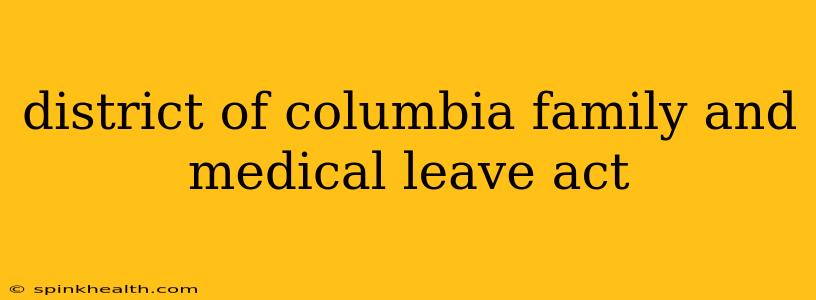The District of Columbia boasts a robust Family and Medical Leave Act (FMLA), offering crucial protections for employees facing family or medical emergencies. Unlike the federal FMLA, DC's version extends coverage and benefits to a wider range of employees and situations. This guide will delve into the intricacies of DC's FMLA, answering common questions and providing a clear understanding of your rights.
Imagine this: Sarah, a dedicated teacher in Washington, D.C., receives devastating news – her mother has fallen ill and requires immediate care. She needs time off to support her mother, but worries about her job security. Fortunately, DC's FMLA steps in, providing Sarah with the necessary leave and job protection. This isn't a hypothetical scenario; it's a reality for many District residents. Let's unpack how it works.
Who is Covered by DC's FMLA?
This is a crucial first step. The DC FMLA doesn't just mirror the federal law; it expands its reach. Unlike the federal act, which requires a minimum number of employees for employer coverage, DC's FMLA covers employees of all private sector employers with at least 5 employees, regardless of the size of the company. This broader coverage significantly increases the number of individuals protected. Public sector employees are also typically covered under separate legislation.
What if my employer has fewer than 5 employees?
While the primary coverage is for employers with five or more employees, it's vital to consult with an employment lawyer or the DC Office of Human Rights to determine your rights if your employer has fewer than five employees. Exceptions and alternative protections might exist depending on specific circumstances.
What Qualifies as a Qualifying Reason for Leave Under DC FMLA?
The District of Columbia's FMLA offers leave for several reasons:
- Serious health condition: This includes an illness, injury, impairment, or physical or mental condition requiring inpatient care or continuing treatment or supervision by a health care provider. This is a broad definition and covers a wide range of conditions.
- Care for a family member with a serious health condition: This extends to spouses, children, and parents. The definition of "family member" is broader than some other states' interpretations.
- Birth and bonding with a newborn child: This includes adoption and foster care placements.
- Qualifying exigency related to a family member's military service: This provision covers situations where a family member is called to active duty or faces a military emergency.
Can I take leave for a less serious medical condition?
While the DC FMLA primarily covers serious health conditions, it's worth noting that other laws, such as the DC's sick leave law, may provide additional protection for less severe medical conditions or personal needs. It's important to understand the nuances of all applicable laws.
How Much Leave Am I Entitled To?
DC FMLA offers up to 12 weeks of unpaid, job-protected leave within a 12-month period. This is often more generous than the federal FMLA's offerings.
Is my leave paid?
DC's FMLA leave is generally unpaid. However, your employer might have policies that provide paid leave for some or all of this time. The District of Columbia also has separate paid family and medical leave insurance programs that might cover a portion of the leave.
How do I request leave under DC FMLA?
Providing your employer with sufficient notice is crucial. It's recommended to provide your employer with a written request for leave, along with supporting documentation from your doctor or other relevant healthcare provider as evidence of your need for leave. Failure to provide proper notification could impact your eligibility for leave.
What are my job protections under DC FMLA?
Upon return from FMLA leave, you are generally entitled to be reinstated to your previous position or an equivalent position with equivalent pay, benefits, and other terms and conditions of employment. However, there are specific exceptions and nuances which a legal professional can clarify.
What happens if my employer violates DC FMLA?
If you believe your employer has violated DC's FMLA, you have legal recourse. It's crucial to document everything thoroughly – your request for leave, any communications with your employer, and any adverse actions taken against you. Consult with an experienced employment attorney in the District of Columbia to understand your legal options and explore potential remedies. The DC Office of Human Rights also provides resources and assistance to employees facing employment discrimination.
This guide serves as an introduction to the complexities of DC's FMLA. Remember, this information is not a substitute for legal advice. For specific guidance on your situation, consult with a qualified employment attorney in the District of Columbia. Navigating employment law can be challenging, but understanding your rights under DC's FMLA empowers you to protect yourself and your family.

